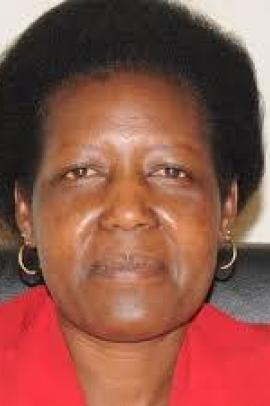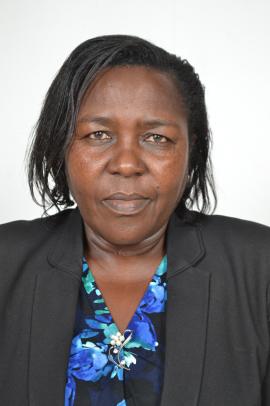Student Short Biography
(Max 250 words)
Ms Doracynthia Muthoni Mundison is a Highly Skilled Professional, with a Career Objective of working in a busy organization that fosters culture of advancement on merit and appreciates innovation and creativity.
She completed her O levels at Muthambi girls, attained a Bachelors degree of Business Administration in Accounting and Finance from Kenya Methodist University, graduated with An Executive Masters of Business Administration from Jomo Kenyatta University. She is a qualified Accountant with a Certified Public Accountant II certificate and very fluent in English and Swahili, and has a Senior Management Course certificate from Kenya School of Government.
She has a wealth of experience and qualifications in Financial management, Administrative skills, Project Management and Community development projects management attained from her 21 years of working experience, Managing Government and Donor funded projects as County Coordinator with Ministry of Public Service and Gender Affairs, National Government Affirmative Action Fund (NGAAF), Meru, A Program Director of the Christian Child Care International and Mikinduri Community Development Organizations
Catholic Diocese of Meru-LVIA water department partly funded by SIDA and Misererior, as an Accountant, Strengthening STD/HIV Control Project with the University of Nairobi in Collaboration with the University of Manitoba, Canada and the Ministry of health funded by Bill Gate Foundation, CIDA& PEPFAR as an Accounts and Administrative Assistant and Clean Air Action Corporation, a project that was partly funded by USAID and I4EI as a Finance & Administrative Officer, African Centre for Open Governance as an Administration Officer, ACDI/VOCA as a assisting in Admin./Accounts duties for a short term, Center for Research in Environment Kenya as a Executive Director.
dmundison@students.uonbi.ac.ke

Thesis / Project Title
DETERMINANTS OF THE PERFORMANCE OF NATIONAL GOVERNMENT AFFIRMATIVE ACTION FUND PROJECTS IN MERU COUNTY,
KENYA
Thesis / Project Abstract
(Max 250 words)
The purpose of this study was to establish determinants of performance for National Government Affirmative Action Fund projects in Meru County, Kenya.
The study sought to achieve the following objectives; to evaluate the extent to which monitoring and evaluation, stakeholders’ participation, capacity building and project risk management influences performance of National Government Affirmative Action Fund projects in Meru County, Kenya.
The study adopted a descriptive research design with the target population being 441 representatives from Youth, Women and PWDS groups in Meru County. Stratified simple random sampling techniques were used to select a sample of 109 respondents. Primary data was obtained using self-administered questionnaires while secondary data was obtained using data collection sheet. Data was analysed using Statistical Package for Social Sciences (SPSS Version 25.0) which is the most recent version. Descriptive statistics such as frequencies, percentages, mean score and standard deviation was estimated for all the quantitative variables and information presented inform of tables. The qualitative data from the open-ended questions were analysed using conceptual content analysis and presented in prose. Inferential data analysis was done using multiple regression analysis.
The study established that that efficiency and effectiveness, needs assessment and frequency of monitoring greatly influences performance of National Government Affirmative Action Fund projects in Meru County, Kenya. The study established that baseline surveys moderately influence performance of National Government Affirmative Action Fund projects in Meru County, Kenya. The study concluded that monitoring and evaluation had the greatest influence on performance of National Government Affirmative Action Fund projects in Meru County, Kenya followed by project risk management, then stakeholders’ involvement while capacity building had the least influence on the performance of National Government Affirmative Action Fund projects in Meru County, Kenya.
The study recommends that project stakeholders need to hire people who are well trained and have a track record of successful monitoring and evaluation of mega projects that have delivered beyond expectations within the shortest time possible and with limited resources. There is need for stakeholders’ involvement or inclusivity in the project development cycles since it is clear that their participation has a positive and significant influence on performance of projects.





